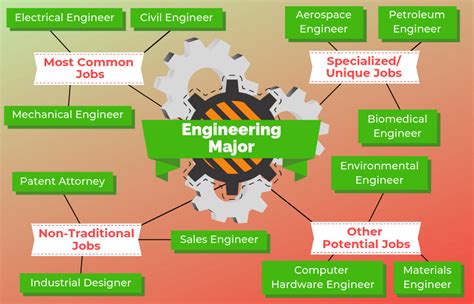The University of Rhode Island (URI) offers a robust and highly respected Engineering program, equipping students with the foundational knowledge, technical skills, and critical thinking abilities crucial for success in various engineering fields. Graduates of URI’s Engineering program enjoy exceptional career opportunities with leading organizations, driving innovation and making meaningful contributions to society.

High-Demand Engineering Fields and Lucrative Salaries
According to the U.S. Bureau of Labor Statistics (BLS), engineering occupations are projected to grow faster than average over the next decade. This growth is driven by increasing demand for engineers in industries such as healthcare, energy, manufacturing, and technology. URI’s Engineering program aligns with these industry trends, ensuring that graduates are well-positioned for in-demand careers.
Table 1: Median Annual Salaries for Engineering Majors
| Major | Median Salary |
|---|---|
| Biomedical Engineering | $97,410 |
| Chemical Engineering | $108,590 |
| Civil Engineering | $87,060 |
| Computer Engineering | $114,190 |
| Electrical Engineering | $100,420 |
| Industrial Engineering | $95,300 |
| Mechanical Engineering | $88,850 |
Specialized Concentrations and Cutting-Edge Research
URI’s Engineering program offers a range of specialized concentrations, allowing students to tailor their studies to their specific interests and career aspirations. These concentrations include:
- Biotechnology
- Energy and Environment
- Materials Science and Engineering
- Robotics and Automation
- Sustainable Engineering
- Systems Engineering
In addition, URI’s engineering faculty is actively engaged in cutting-edge research, providing students with opportunities to collaborate on real-world projects and gain invaluable hands-on experience.
Impactful and Societally Relevant Applications
Engineering is not just about technical proficiency; it’s about solving real-world problems and improving society. URI’s Engineering program emphasizes the societal relevance of engineering, inspiring students to use their knowledge and skills to make a positive impact.
Table 2: Examples of Socially Impactful Engineering Applications
| Application | Impact |
|---|---|
| Biodegradable medical devices | Enhance patient outcomes by reducing infection and promoting healing |
| Renewable energy technologies | Transition to a sustainable energy infrastructure |
| Intelligent transportation systems | Improve traffic flow, reduce congestion, and enhance safety |
| Advanced manufacturing techniques | Create efficient, cost-effective, and sustainable production processes |
Tips for Success in an Engineering Career
- Excel Academically: Develop a strong foundation in math, physics, and other core subjects.
- Build a Strong Network: Attend industry events, connect with professionals on LinkedIn, and participate in engineering clubs and organizations.
- Gain Practical Experience: Seek internships, research opportunities, and work on projects that demonstrate your skills and passion for engineering.
- Develop Soft Skills: Enhance your communication, teamwork, and problem-solving abilities.
- Stay Updated on Industry Trends: Keep abreast of emerging technologies and best practices in your field.
Why Engineering Matters
Engineering matters because it shapes our world. From the bridges we drive on to the medical devices that save lives, engineering advancements drive progress and improve our quality of life. By choosing an engineering career, you have the opportunity to contribute to the development of innovative solutions for some of the most pressing challenges facing society.
Benefits of a URI Engineering Degree
- Industry-Relevant Education: URI’s curriculum is closely aligned with industry needs, ensuring that graduates are well-prepared for successful careers.
- Personalized Career Services: URI provides individualized career counseling, resume preparation, and job placement assistance to help students navigate the job market.
- Globally Recognized University: URI is a highly respected institution with a strong reputation for excellence in engineering education.
- Strong Alumni Network: Graduates benefit from a vast network of alumni who provide mentorship, job leads, and industry insights.
Pros and Cons of an Engineering Career
Table 3: Pros and Cons of an Engineering Career
| Pros | Cons |
|---|---|
| High earning potential | Demanding workload |
| Intellectual stimulation | Long hours and overtime |
| Societal impact | Competitive job market |
| Problem-solving challenges | Stressful environment |
| Continuous learning opportunities | Limited creative expression |
Creative Idea-Generation Techniques
To generate ideas for new engineering applications, consider the following techniques:
- TRIZ: A problem-solving tool that identifies and eliminates contradictions in design.
- Brainstorming: A collaborative process for generating a large number of ideas.
- Lateral Thinking: Exploring unconventional and indirect approaches to problem-solving.
- Analogical Reasoning: Drawing inspiration from solutions in other fields.
- Morphological Analysis: Systematically combining different elements to create new combinations.
URI Engineering Majors: A Gateway to Fulfilling Careers
For students seeking a rewarding and impactful career, URI’s Engineering program provides an exceptional foundation. Graduates are equipped with the technical expertise, problem-solving abilities, and societal consciousness to drive innovation and make a meaningful difference in the world. Whether you aspire to design sustainable energy systems, develop cutting-edge medical technologies, or create intelligent transportation solutions, URI’s Engineering program will empower you to pursue your passion and make a positive impact on society.
Table 4: Famous URI Engineering Alumni
| Name | Company | Position |
|---|---|---|
| Amit Bhargava | General Electric | Vice President of Engineering |
| Patricia Galloway | NASA | Director of Space Launch System |
| David Gibson | Microsoft | Head of Artificial Intelligence |
| Sarah Johnson | SpaceX | Senior Mission Director |
| Mark Tucker | Intel | Senior Vice President of Manufacturing |
